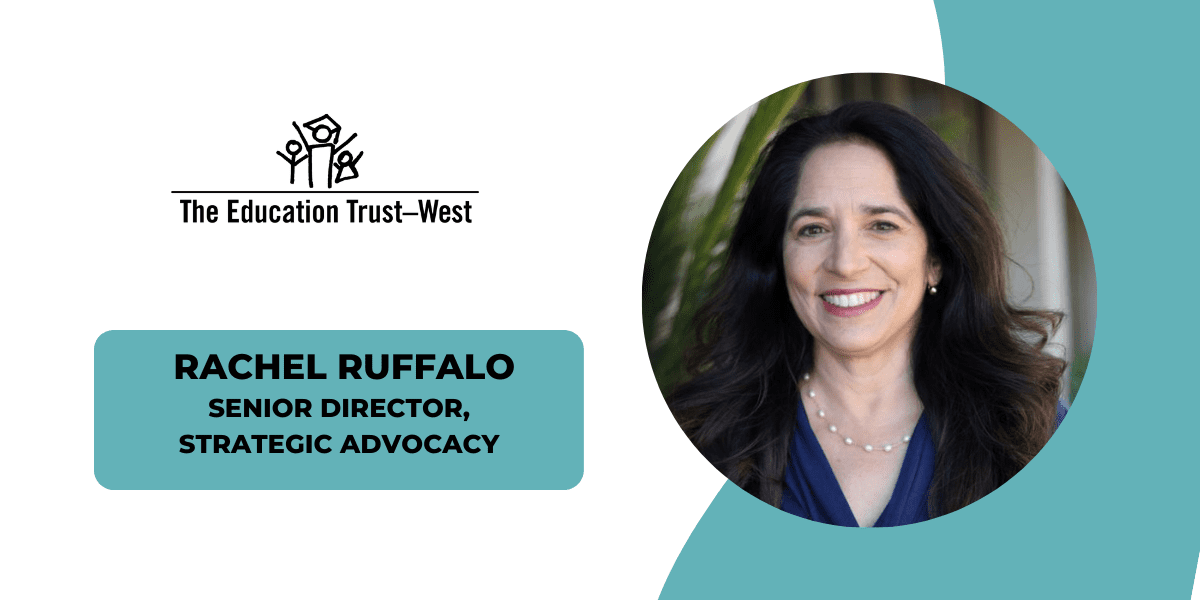Question: You’ve been with Ed Trust–West since 2017, but were just named Senior Director, Strategic Advocacy. What excites you about this new role?
This is an exciting time for the organization. We’ve grown a good amount since I joined the team six years ago, which I think is a real testament to our team but also to the importance of this work. And Ed Trust–West is about to roll out a new strategic plan, so it’s a great opportunity for us to rethink our internal work structures, to make sure that we’re working together as effectively & strategically as possible. I’m also looking forward to being in this role in order to build upon the momentum of some recent positive policies that have been passed in California, and to safeguard those gains against anti-equity forces. I’ve seen over the years how much the diversity of our teams at Ed Trust–West is our “special sauce”. So I’m also excited to be in this role as a way to support our teams to play that special role in helping to ensure that our advocacy is rooted in the experiences of students, families, communities and educators of color, research-based, and engages our partners across the state.
Question: You’ve led and/or supported numerous Education Equity Audits and Blueprints for Equity Action Planning processes over the years. You’ve previously shared key findings for districts, I’m wondering if you can speak to what you’ll take away from those processes, from all your in the field work with districts, as you think about this new strategic advocacy role?
What’s been evident in every district we’ve worked in is how much the job of being an educator and operating schools and districts is incredibly complex and demanding. I’ve taught in California high schools and served as a school administrator, so I’ve known the demands of the job firsthand, and yet through this work I’ve seen more dimensions to those demands, the increasing complexities. Passing equitable policies is crucial, of course, but we must also consider what will be needed to effectively implement them, and then ensure schools, districts, and colleges are given the support they need. I see this new role, in part, as strengthening our focus on all parts of the continuum of policy development and implementation.
Everywhere we’ve worked with school districts around the state, one thing is consistently clear – educators are hungry for actionable research on what works to advance equity in schools & districts; they really value learning about promising practices and bright spot examples from their peer educators. Even within a context of local control, the state has an important role to play in leading equitable practice by providing clear guidance (mandates when necessary), aligning and strengthening statewide systems of support and infrastructure to provide local leaders with the resources, tools, and supports they need to implement policies equitably and in alignment with existing initiatives. Local leaders tend to adopt policy and practice changes more robustly when there is a clear set of expectations from the state and technical support (from County Office of Education or other educational partners) to implement the changes. In response to what we’ve heard so clearly at the local level, we’ve uplifted the importance of this guidance and support in our advocacy work, pushing for things such as state budget investments to build the statewide professional development infrastructure to implement the new math and science standards and curriculum frameworks. And it’s why we’ve pushed for urgency on crucial state guidance like urging the state board of education to release the revised California Math Framework. We know California needs that framework in order to provide educators, system leaders, and curriculum developers the guidance they need to ensure that all students gain the math skills and tools to meet their educational and career goals.
Question: You were a first generation college student yourself. When you look at equity in higher education in California now, what progress do you think we should celebrate? What priorities do you think we need to focus on?
I’ve been in a reflective moment around starting college lately, as my oldest child just graduated high school and will head to college in the Fall. I’m the parent of three kids who have all attended California public schools, and I’ve been an LCAP parent volunteer. I’ve experienced “college and career readiness” discussions in both personal and professional settings, and we’ve definitely made progress in the years since I was in the first generation of my family to go to college. There are notable efforts seeing results when it comes to better preparing students to be successful in college and in providing some of the supports many first generation students, students of color and low-income students need. California’s AB 469 (which ETW fought for, along with many partners) for instance, is helping to reduce cost as a barrier to pursuing higher education. This is something to celebrate!
At the same time there are many other ways that our systems can and must change to ensure that all students – and especially students who are underrepresented in higher education – can achieve their educational and career goals. As a state, we still have a good amount of work on ensuring smoother transitions from high school to college, including making the full cost of attending college affordable to students from low-income households. We also can’t ignore what students are continually communicating about their experiences, meaning we need to make sure courses are culturally and linguistically affirming and relevant, and that college students’ mental health needs are adequately and respectfully addressed. Lastly, and especially as California strengthens our education data infrastructure, we should use data to our advantage, supporting higher education institutions and the state to identify groups of students who need targeted supports, such as multilingual learners, parenting students, and newcomer students.
Question: When you think about the California education equity landscape, what do you think is unique or important to remember as we do this work?
California enjoys a reputation for having progressive values, and I think it’s important for advocates to continue to push our state and local leaders to live into those values. Progressive values and equity rhetoric alone won’t change students’ lives. Instead, we need to drive actions that actually result in excellent learning opportunities and outcomes for students of color and multilingual learners, especially those experiencing poverty – including those from Black, Latinx, Asian, Pacific Islander, and Native American communities.
It’s very important that we remember that California is a large and diverse state that defies generalizations and one-size-fits-all approaches. For this reason, it is essential that policy makers and advocates alike listen to and be led by the people closest to classrooms and campuses — students, their families & communities, and educators — as they craft and implement policy solutions. I also serve on the board of a community-based organization aiming to facilitate collective impact across multiple sectors to advance educational equity in our county. In that context, just like my work at Ed Trust–West, I’ve seen how complex tackling the nuanced nature of educational equity and policy is. And I’ve also seen and increasingly appreciate that none of us can do this work alone.




